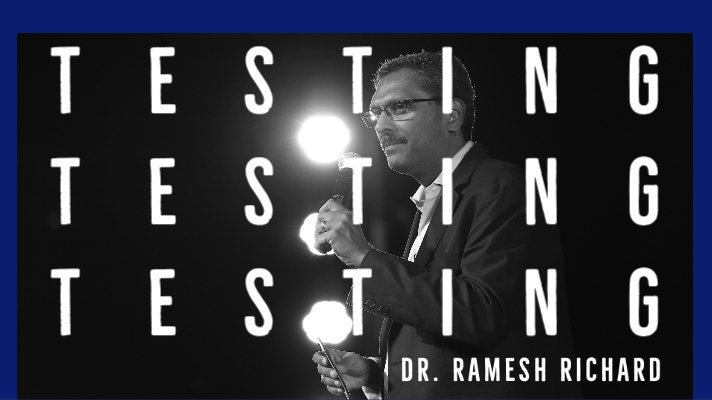
How to Grow as a Leader as Your Church Grows
April 16, 2019
5 Challenges With Being A Local Pastor (or Leader) in the Age of Social Media
April 25, 2019Leading With Courage and Compassion

Mikel Del Rosario
Welcome to The Table where we discuss issues of God and culture. I’m Mikel Del Rosario, Cultural Engagement Manager at the Hendricks Center. And today our topic is leading with courage and compassion. I have two guests in the studio today. First guest is Dr. Darrell Bock, Executive Director of Cultural Engagement and Senior Research Professor of New Testament at Dallas Seminary. Welcome, Darrell.
Dr. Darrell Bock
I’m glad to be here.
Mikel Del Rosario
Thanks for being one of our expert guests today.
Dr. Darrell Bock
I’m feeling odd in this chair, but I should be okay.
Mikel Del Rosario
And our second guest is Bill Hendricks, Executive Director of Leadership at the Hendricks Center. Thanks for being on the show.
Bill Hendricks
Thanks for having me.
Mikel Del Rosario
Well, Darrell, I want to just dive right into our discussion and you wrote an article recently about leading in a shifting culture, a rapidly shifting culture. Explain to us a little bit about this cultural shift that you’ve seen in your ministry.
Dr. Darrell Bock
Well, you can think about it in a variety of ways. Let me just give a couple of examples. Think about communication just for a second. I remember being very, very young in 1962. I was eight years old at the time. People can try and figure out how old that makes me now, but I won’t do the math. And when the Telstar satellite gave the first live broadcast between Europe and the United States, and it was such big news that they broke into the broadcast that they were in the midst of … I think I was watching a cartoon or something … and, lo and behold, we got to see the UK live. And then just think about how often that happens today, in a variety of ways. Not just on news channels, but I can call my neighbor from halfway across the world. We can FaceTime together, that kind of thing. So that’s one kind of change.
And then there’s this … there are the social changes that, of course, we’ve seen in my own lifetime, as well. So we live in a time of rapid change, in which the leaders in the church are having to speak to people who are also having to cope with all these changes in one way or another. The world that our children are growing up in, or our grandchildren in my case, is very different than the world I grew up in. So how does the church prepare people for that? That actually is a challenge for leaders in the church. And so we exist, at the Hendricks Center, to help leaders negotiate through that, and to think through what those changes represent, and the kind of pressures that are faced as a result of some of those changes.
Mikel Del Rosario
You talked before about how, in this time, as we’re doing ministry, we find that more and more throughout the country the Bible isn’t the answer in the minds of many people, but rather it’s the question. And so it’s a different game from when, let’s say 19th century, 20th century America for most of the 20th century, where you could quote the Bible to someone as a pastor, and have them give a little bit of respect, maybe, to the text, because of their cultural heritage. How do you see the church having to respond to that kind of change?
Dr. Darrell Bock
Well, it responds in a couple of ways. One is that people better be equipped to explain what the Bible is, and why they believe the Bible is the inspired word of God. And the second is they need to be able to say I … there’s a line that I say when I speak about this … that we used to be able to say, “It’s true because it’s in the Bible.” And whether someone was a member of the church or not, there was enough Judeo-Christian net around our culture they’d say, “Well, that’s at least a respected religious source. That’s gonna help me think about how to live life.” And so they would accept it, whether they accepted everything about what the Bible was or not.
Today, that’s no longer true. A lot of people have questions about the Bible. They have questions about what kind of work it is, that kind of thing. So now we have to argue that it’s in the Bible because it’s true. That’s a different kind of argumentation. The idea is, well, God has inspired this and said this is the way to live, because this is a helpful way to live on its own intrinsic merit. So how do you make that argument in that kind of a way, and how do you think about it? So, the church has to think about how the Bible addresses the authenticity of life, and what makes for a good way of living in human flourishing, and not simply put the imprimatur of the Bible on it, but understand the theological and human, and anthropological rationale for why God would say that’s a good way to live.
Mikel Del Rosario
We talk about that a lot, nowadays, in terms of cultural engagement at the Center. But Bill, let me ask you to take us back to the ’80s, when the Hendricks Center first began. Talk a little bit about your dad, and how Howard Hendricks began to focus on leadership, and what his focus was in that regard.
Bill Hendricks
Sure. And, as you mentioned, my dad is Howard Hendricks. He taught at Dallas Seminary for 60 years. He founded what was called the Department of Christian Education. And some of the themes that he was big on, I guess you’d say, in addition to education were leadership, and mentoring, discipleship, and Christian home was another classic area for him. And, of course, nobody got through seminary without having to take his Bible Study Methods course. That was pretty much a required course for all concerned. And he had a huge influence, and he’s now with the Lord.
But in the mid ’80s, he used to say, “The greatest crisis in America is a crisis of leadership. And the greatest crisis of leadership is a crisis of character.” And with that kind of spirited mind, he founded and brought some others in to work with him on what became called the Howard G. Hendricks Center for Christian Leadership. And they began to really think through what does it take to lead people, not just in churches and in Christian institutions, but also out in society, in the marketplace and in workplaces, in the military, in government?
Dad was very much about the practice of the word. He had done his thesis on the Book of James. And so a lifelong theme for him was, “Let’s not just be hearers of the word, let’s be doers of the word.” And he kept driving toward the practical. How does this apply to everyday life? And it really was the perfect setup for where things have gone today, because today, more than ever, we need to be asking the question, “How does our theology, how does our Bible, how does it work? In day-to-day life, what difference does this make?” And people are really seeking that answer, if they’re people of faith.
For complete transcript please go here.


